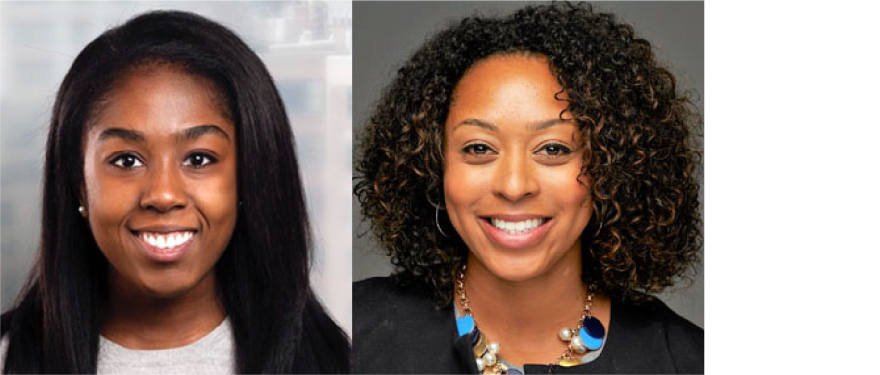“Uncharted: Black Visionary Leadership and Redefining What’s Possible,” February 28-29, combines two new events with the African American Student Union’s (AASU) 47th Annual H. Naylor Fitzhugh Conference: the Black Tech Master Series and a competition for early-stage Black entrepreneurs. We sat down with Kim and Tyler, the MBA students who created these events.
What inspired you to create these two new events?
Kim: Tyler and I are very passionate about diversity, equity, and inclusion. Both of us are on the AASU board, and Tyler is the co-facilitator of the Diversity Equity Inclusion Council (DEI) and I’m the co-president of AASU. After we graduate, we’re going to work in those spaces in finance and tech—I’m going into Venture Capital (VC) at Goldman Sachs, and Tyler is heading to Facebook.
The statistics regarding black entrepreneurs are staggering. Fewer than one percent of black entrepreneurs get VC funding, and of that .0006 percent goes to black women entrepreneurs. This is not because there is a lack of innovative ideas and lucrative ventures from black founders. There are a number of factors for this discrepancy, one being the strength of their networks in the venture capital space. According to McKinsey, an entrepreneur with a “warm” connection—someone they’ve met—is 13 percent more likely to get funding than a “cold” connection. Forty percent of VCs go to two schools: Harvard and Stanford. It’s a field comprised primarily of white men. If you’re not in those spaces, you just don’t have the same chance.
In thinking about what we could do during our time at HBS to help level the playing field, we came up with these concepts as an independent project. We recognize that we are extremely privileged to be here and be able to access all of Harvard’s phenomenal resources. We wanted to bring opportunity to people who are not within the Harvard community—if you’re here, the door is already open in so many ways. How do we open up some of these resources to black entrepreneurs across the country? We came up with a day of educational sessions and a funding competition to occur around the AASU conference, to offer educational, networking, and funding opportunities.
Tell us about Friday’s Master Series.
Tyler: It’s a full day of tech and entrepreneurship programming, designed to help equip black entrepreneurs with the educational resources to ask the right questions and look in the right places for funding and opportunities. Topics include product-market fit, financing, paths to profitability, and digital marketing. Jewel Burks Solomon, the new head of Google startups, kicks off the day talking about her new role and her non-linear path toward entrepreneurship. The day is capped by Damien Hooper-Campbell (MBA 2009), eBay’s chief diversity officer, talking about their strategy as a major tech company to diversify their workspace and create a more inclusive environment.
And the entrepreneur competition?
Tyler: We had this idea of putting actual money behind some of these black ventures. We were hoping for 100 applications, and ended up with approximately 300. We had a lot of help; advice from Jodi Gernon and Chuck Collins at the Rock Center, the HBS alumni network, and faculty members such as Jeffrey Bussgang, Julia Austin, Jan Rivkin, and our advisor Karen Mills. They opened up their Rolodexes and sent a few emails. Their buy-in helped elevate our mission, and made people want to get involved. It was the ultimate “warm” connection!
We’ve just narrowed down the 300 applicants to 20 finalists. On Thursday evening, February 27, they attend a networking reception sponsored by Mass Challenge. Then they all participate in Friday’s Master Series, which gives them an opportunity to get expert advice and support and refine their pitches, which they present on Friday evening. The judges select five, who pitch on Saturday to the 500+ attendees at the AASU conference. Two founders will be awarded $50,000 each. We are thrilled that we were able to secure $100,000 from General Catalyst and Khosla Ventures.
We're really excited to have leaders in the venture capital and entrepreneurship space serve as judges and ultimately give two entrepreneurs capital to take their ventures to the next level. Both events will hopefully provide an opportunity for all of these entrepreneurs to build their network, learn from experts in the field, and access opportunities for further venture education and funding.
What are your hopes for the future of these events?
Kim: Our ultimate hope is that it carries on after we leave. We are only here for two years—we come in, we’re hunkered down our first year, then we have a year to create. We want to find a way to institutionalize both events. It’s such an important mission, and they provide a structured way for HBS to invest in being part of the discussion. If it continues, we think it could drive lasting impact in the community.

